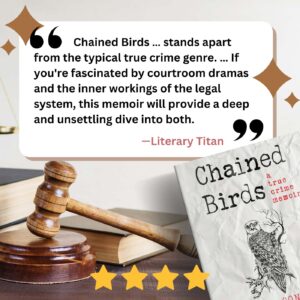
More early praise continues to roll in for my debut, Chained Birds: A True Crime Memoir, launching November 12, 2024, with WildBlue Press. Is it okay to stop pinching myself now? As I mentioned in my post about getting my first “highly recommended” and 5-star editorial review from Readers’ Favorite, I am slowly recovering from the impostor syndrome that afflicts many debut and established authors. It turns out these early professional critiques aren’t just for readers’ benefit!  Not only is this early praise a marketing must-have to showcase a book’s value and legitimacy, but who knew it would be so therapeutic? I did not, at the outset of this publishing journey, understand all the nuance that comes with these early positive reviews. And I’m grateful to the professionals who read Chained Birds and offered their thoughtful analysis—they get it! I can’t ask for anything more. My newest batch includes a review from BestThrillers.com, an influential online source for thriller fans to discover amazing new books. Their stated mission is to “help readers choose from the more than one million new titles published each year,” and they are “dedicated to surfacing the most compelling, edge-of-your-seat thrillers from around the world.”
Not only is this early praise a marketing must-have to showcase a book’s value and legitimacy, but who knew it would be so therapeutic? I did not, at the outset of this publishing journey, understand all the nuance that comes with these early positive reviews. And I’m grateful to the professionals who read Chained Birds and offered their thoughtful analysis—they get it! I can’t ask for anything more. My newest batch includes a review from BestThrillers.com, an influential online source for thriller fans to discover amazing new books. Their stated mission is to “help readers choose from the more than one million new titles published each year,” and they are “dedicated to surfacing the most compelling, edge-of-your-seat thrillers from around the world.”
The Bottom Line: An emotional, eye-popping and personal expose of the American prison system that begins with an orchestrated stabbing and ends with a realistic exploration of second chances.
Chained Birds begins on a snowy Pennsylvania day in 2011, as Lewisburg prison inmate Steven “Oakie” Tremblay throws a snowball at a correctional officer named Captain MacDonald. Tremblay is then placed in a rec cage with two other inmates, where he suffers approximately 40 stab wounds in 30 seconds before a correctional officer calls off the attack, saying Tremblay has “had enough.”
Subsequently, a civil suit is brought by Tremblay against the Bureau of Prisons (BOP), while one of Tremblay’s attackers – Kevin Sanders – is charged and offered a five-year plea deal. The author, journalist Carla Conti, is contacted by Sanders’ attorney to help edit a website in hopes of using it to help raise funds to hire an expert witness.
The result is the fascinating story of Conti’s decade-long role on Sanders’ legal team, in which she serves as a paralegal, researcher and writer. Written with a level of detail that would be the envy of any novelist, Chained Birds is the story of her mission to advocate for Sanders and help him re-enter society after prison. Why advocate for one of Tremblay’s assailants? Conti’s depiction of Sanders, who grew up in an abusive home, is unflinching to the end, but is also quite sympathetic, viewing him as a product of his environment. Sanders’ gang affiliation, both before prison and while incarcerated, is seen as largely a matter of survival. Behind bars, he’s a highly observant artist who devotes ample time to painting. Most of all, due to a threat by prison officials, Conti believes he had no choice but to assault Tremblay – or face his own demise.
The stakes get even higher as Sanders discovers a plot to kill him. And when gang members steal his address book, he warns Conti that her own life may be in danger.
The first third of the memoir is largely devoted to fascinating backstory on the book’s notable characters, including inmates, attorneys and prison officials. For context, Conti expands the narrative in the latter-half of the book to include the Airbnb craze, the COVID era and her (often hilarious) attempts to cope with the Trumpocalypse, including ordering a Trump voodoo doll. Throughout the multiple eras noted in the book, the story proves to be an effective and emotional expose on the problems with the American justice system and the challenges of breaking free from a life of crime and incarceration. Highly recommended.
Then I received this lovely review by Amanda Hanson for The US Review of Books, a premier literary book review publication:
“At 3:24 p.m., at the bottom of the stairwell, Rivera pressed the panic button on his body alarm and prayed someone would reach him in time.”
Kevin Sanders is in a difficult situation. He has been convicted of aiding and abetting an assault on an unarmed fellow inmate. However, Kevin felt he had no choice, as he believed that the other inmate would have killed him if he hadn’t participated in the fight. Fortunately, the victim, Steven Tremblay, survived. Kevin is now awaiting his sentencing, and his lawyer, Scott, is working to reduce the sentence. Meanwhile, Kevin is concerned for his safety and is not being taken seriously by prison authorities. His fears come true when another inmate tries to harm him, leading to Kevin being placed in protective custody. Eventually, Kevin receives his sentencing, but Scott hopes to gather evidence for a retrial to support Kevin throughout this challenging journey.
Conti delves deeply into gangs and corruption in prison in this powerful book. She fearlessly confronts civil rights lawsuits concerning prison conditions and inmate treatment. The author effectively incorporates these issues into the narrative using the protagonist, Kevin, as a powerful vehicle. Conti adeptly exposes how gangs operate in prison and the relentless “survival of the fittest” mindset, where individuals may resort to anything, including taking a life, to survive. Additionally, Conti boldly sheds light on the involvement of corrupt correctional officers, making it nearly impossible for inmates to have a fair chance at survival. Each character possesses a unique and compelling voice that distinguishes them, revealing their complex personalities. The book also fearlessly addresses flaws in the judicial system, highlighting how cases can languish for years, causing profound frustration for inmates.RECOMMENDED
A third review landed in my inbox the first week of September from Independent Book Review, a source for best indie-press books, and was written by John Murray:
A compelling true crime exposé of a corrupt prison program and the lives forever changed when it was brought to light. Carla Conti is a true crime journalist and staunch prison reform advocate. In Chained Birds, Conti becomes part of the story herself.
She was asked to tell the story of Kevin Sanders and the conditions he experienced as a convict serving his sentence at Lewisburg Prison in Pennsylvania. Sanders’ legal team soon hires her to help his defense, specifically a series of unjust assault charges.
It all started with a snowball, and it would, pardon the pun, snowball into something more. One inmate launched a snowball at a corrections officer before assaulting him—the officer’s revenge led to an orchestrated rec cage assault that involved Sanders through no fault of his own. This is the event that brought Sanders to Conti’s attention, as well as the prison’s Special Management Unit, which turned out to be rife with abuse, corruption, and violence.
As a journalist and advocate, she became a fierce supporter not only for Sanders but for reformation of the entire prison system. The trial was just the beginning as Conti recounts her life before, during, and after the case, including the political strife, family drama, and even the writing of this book.
Conti writes with an endearing balance of humor and passion, and she is a driven and intelligent advocate for those without a voice—even before working with Sanders. Without her assistance on the case, he might have disappeared into the system and the SMU program may have gone unnoticed.
A large swath of this memoir is devoted to Sanders, with several sections edited from his own words or letters he gifted to Conti. He was not a perfect man and he tried his best to overcome the various issues plaguing him—drug use, gang affiliation, prison torture. Conti steps back and lets Sanders be his authentic self, resulting in a two-person memoir that is at turns heartfelt and bittersweet.
The book is nonfiction and drawn from real documents and transcripts, but Conti artfully dramatizes things to feel almost like a legal thriller. As she points out at the beginning: “This is a work of nonfiction. Certain names and places have been changed for the privacy and protection of some story participants. Any resemblance to actual persons, living or dead, or real events is absolutely true.” The “real” aspect of the story makes the harrowing elements—prison violence, a potential attack against Conti herself, and Sanders’ life—even more explosive.
Chained Birds is like two great books in one: a captivating true crime story that exposes a deplorable prison program and an engrossing memoir of a journalist making a difference.
I hope these words can sustain me when the inevitable not-so-wonderful reviews come in from readers and others who don’t delight in Chained Birds. From this post, and these reviewers, to my ears, in just a couple of months …
This post, originally written on 8/31/24, has been updated on 11/30/24 to include the permanent review links.
“At 3:24 p.m., at the bottom of the stairwell, Rivera pressed the panic button on his body alarm and prayed someone would reach him in time.”
Kevin Sanders is in a difficult situation. He has been convicted of aiding and abetting an assault on an unarmed fellow inmate. However, Kevin felt he had no choice, as he believed that the other inmate would have killed him if he hadn’t participated in the fight. Fortunately, the victim, Steven Tremblay, survived. Kevin is now awaiting his sentencing, and his lawyer, Scott, is working to reduce the sentence. Meanwhile, Kevin is concerned for his safety and is not being taken seriously by prison authorities. His fears come true when another inmate tries to harm him, leading to Kevin being placed in protective custody. Eventually, Kevin receives his sentencing, but Scott hopes to gather evidence for a retrial to support Kevin throughout this challenging journey.
Conti delves deeply into gangs and corruption in prison in this powerful book. She fearlessly confronts civil rights lawsuits concerning prison conditions and inmate treatment. The author effectively incorporates these issues into the narrative using the protagonist, Kevin, as a powerful vehicle. Conti adeptly exposes how gangs operate in prison and the relentless “survival of the fittest” mindset, where individuals may resort to anything, including taking a life, to survive. Additionally, Conti boldly sheds light on the involvement of corrupt correctional officers, making it nearly impossible for inmates to have a fair chance at survival. Each character possesses a unique and compelling voice that distinguishes them, revealing their complex personalities. The book also fearlessly addresses flaws in the judicial system, highlighting how cases can languish for years, causing profound frustration for inmates.RECOMMENDED
A third review landed in my inbox the first week of September from Independent Book Review, a source for best indie-press books, and was written by John Murray:
A compelling true crime exposé of a corrupt prison program and the lives forever changed when it was brought to light. Carla Conti is a true crime journalist and staunch prison reform advocate. In Chained Birds, Conti becomes part of the story herself.
She was asked to tell the story of Kevin Sanders and the conditions he experienced as a convict serving his sentence at Lewisburg Prison in Pennsylvania. Sanders’ legal team soon hires her to help his defense, specifically a series of unjust assault charges.
It all started with a snowball, and it would, pardon the pun, snowball into something more. One inmate launched a snowball at a corrections officer before assaulting him—the officer’s revenge led to an orchestrated rec cage assault that involved Sanders through no fault of his own. This is the event that brought Sanders to Conti’s attention, as well as the prison’s Special Management Unit, which turned out to be rife with abuse, corruption, and violence.
As a journalist and advocate, she became a fierce supporter not only for Sanders but for reformation of the entire prison system. The trial was just the beginning as Conti recounts her life before, during, and after the case, including the political strife, family drama, and even the writing of this book.
Conti writes with an endearing balance of humor and passion, and she is a driven and intelligent advocate for those without a voice—even before working with Sanders. Without her assistance on the case, he might have disappeared into the system and the SMU program may have gone unnoticed.
A large swath of this memoir is devoted to Sanders, with several sections edited from his own words or letters he gifted to Conti. He was not a perfect man and he tried his best to overcome the various issues plaguing him—drug use, gang affiliation, prison torture. Conti steps back and lets Sanders be his authentic self, resulting in a two-person memoir that is at turns heartfelt and bittersweet.
The book is nonfiction and drawn from real documents and transcripts, but Conti artfully dramatizes things to feel almost like a legal thriller. As she points out at the beginning: “This is a work of nonfiction. Certain names and places have been changed for the privacy and protection of some story participants. Any resemblance to actual persons, living or dead, or real events is absolutely true.” The “real” aspect of the story makes the harrowing elements—prison violence, a potential attack against Conti herself, and Sanders’ life—even more explosive.
Chained Birds is like two great books in one: a captivating true crime story that exposes a deplorable prison program and an engrossing memoir of a journalist making a difference.
I hope these words can sustain me when the inevitable not-so-wonderful reviews come in from readers and others who don’t delight in Chained Birds. From this post, and these reviewers, to my ears, in just a couple of months …
This post, originally written on 8/31/24, has been updated on 11/30/24 to include the permanent review links.
Carla Conti is a true crime journalist, storyteller, and prison reform advocate. Her debut book, Chained Birds: A True Crime Memoir of Justice, Survival and Redemption Behind Bars, is out now with WildBlue Press.








